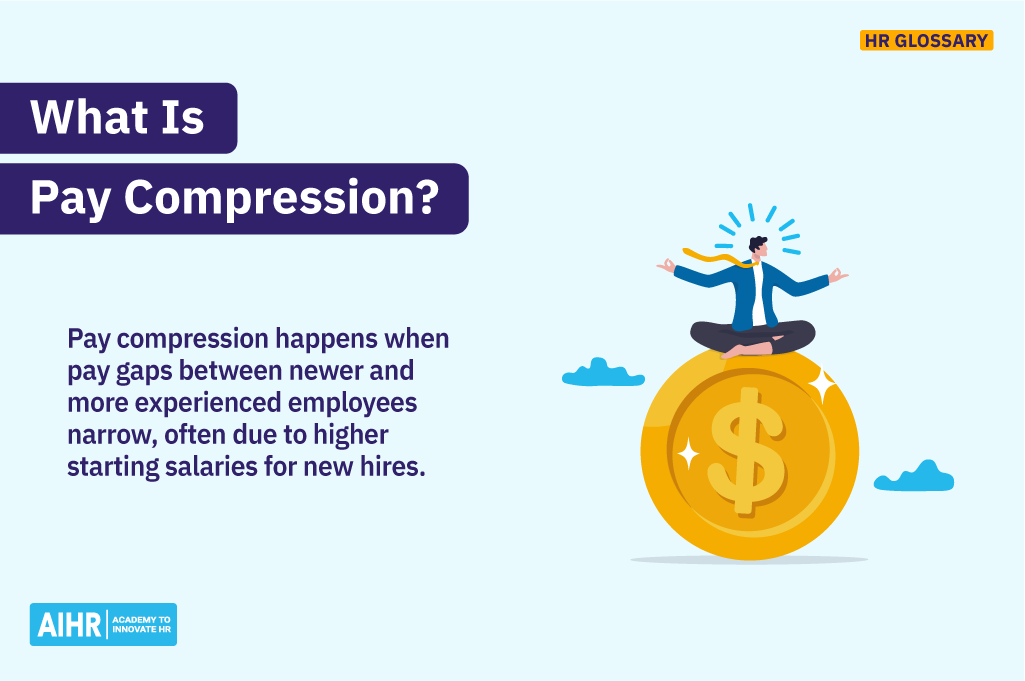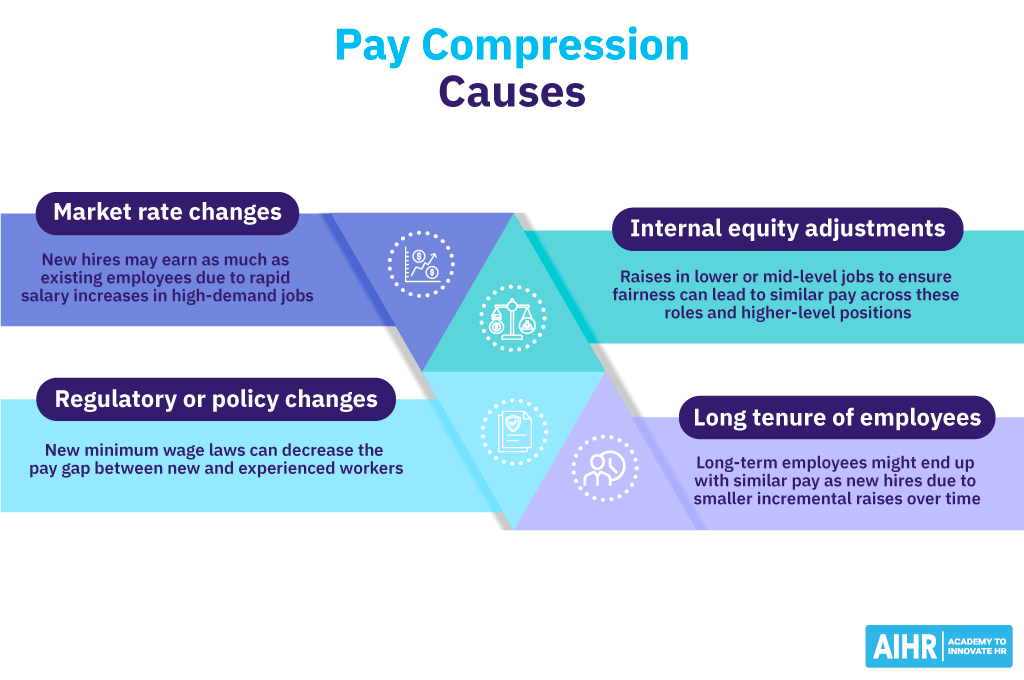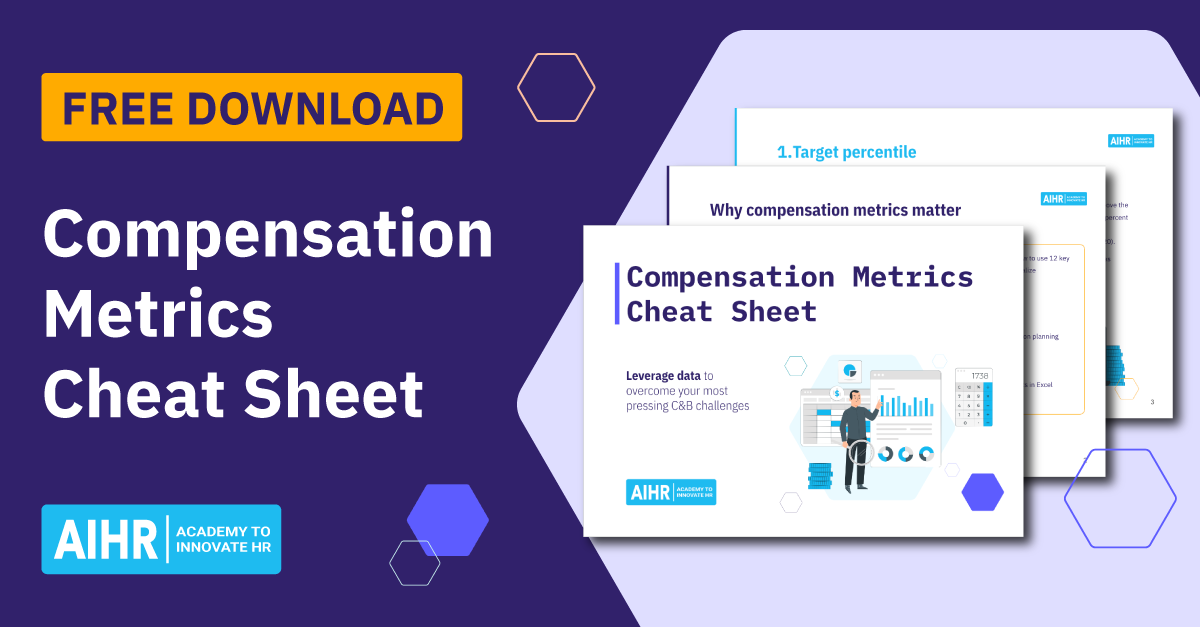Pay Compression
What is pay compression?
Pay compression, also known as salary compression or wage compression, happens when the pay differences between employees with varying levels of experience, skills, or seniority become small. This often occurs when new hires are brought in at salaries close to or even higher than those of long-standing employees, usually due to rising market rates, inflation, or increased demand for specific skills.
This situation can lead to several issues within the workplace, including dissatisfaction and demotivation among longer-tenured or more experienced employees.

Pay compression examples
Here are two fictional examples to better understand the concept of pay compression.
- New hires vs. existing employees: Due to market demands, a company hires new employees at salaries close to those of existing staff. For instance, a new accountant is hired at $60,000, while current accountants with several years of experience earn $62,000.
- Minimum wage increases: When the minimum wage is raised, entry-level employees receive higher pay, but the wages of more experienced employees remain stagnant, narrowing the pay gap. For instance, if the minimum wage rises to $15 per hour and more experienced workers previously earned $16 or $17, the gap between entry-level and experienced workers shrinks.
- Internal promotions: When an employee is promoted internally, they may receive a smaller pay increase than if they were hired from outside the company. For example, a junior marketing specialist is promoted to a senior role with a 10% raise, bringing their salary to $65,000. However, external candidates being hired for similar senior roles are offered $70,000 due to current market rates.
What causes pay compression?
Pay compression can arise due to several factors, including:
- Market rate changes: When the market rate for a certain job increases rapidly due to high demand and a shortage of skilled workers, new hires may demand salaries close to or even exceeding those of existing employees in similar roles.
- Internal equity adjustments: In an effort to maintain fairness and internal equity, organizations sometimes raise the salaries of lower or mid-level positions, which can result in those roles being paid similarly to higher-level positions.
- Regulatory or policy changes: Changes in minimum wage laws or other employment regulations can push entry-level wages closer to those of more experienced employees, especially in industries with traditionally lower pay scales.
- Long tenure of employees: In organizations with low turnover, long-tenured employees may experience smaller incremental raises over time, which can result in their pay being similar to that of newer employees who are hired at current market rates.

Pay compression vs. pay inversion
Pay compression and pay inversion are closely related phenomena and often share underlying causes, such as market rate fluctuations and inadequate adjustments to existing pay structures. Both situations highlight challenges in maintaining fair and competitive compensation practices.
Pay compression occurs when the pay difference between new hires and long-tenured employees in similar roles becomes narrow. This usually happens when starting salaries increase in response to market demand, but existing employees’ salaries do not adjust accordingly. Over time, this leads to a small or negligible gap in pay between those who have just joined and those with more experience or tenure.
Pay inversion is an extreme form of pay compression. It refers to a situation when new hires are hired at a salary level that surpasses that of current employees in similar or more senior roles. In competitive hiring markets, companies may offer higher wages to attract talent, which can lead to entry-level employees earning more than their more experienced counterparts.
Both issues can affect morale and retention, but pay inversion is often more noticeable and harder to justify, as it creates a clear disparity in compensation that can be difficult for existing employees to accept.
What are the negative effects of pay compression?
When pay compression takes hold, it can lead to a range of issues that can disrupt team dynamics and impact overall performance. Some of these issues include:
- Decreased morale: Long-term employees may feel undervalued if new hires are paid similarly despite having less experience.
- Higher turnover: Experienced staff may leave for roles elsewhere where their experience is rewarded appropriately.
- Lower productivity: Frustration over perceived unfairness can lead to disengagement and reduced effort.
- Recruitment challenges: Pay compression can make it harder to attract top talent if prospective hires notice limited salary growth over time.
- Increased costs: To address pay compression, companies may need to invest in adjustments to salaries, which can be costly if not managed proactively.
How HR can fix pay compression
Addressing pay compression effectively requires a strategic approach. Here are several steps HR can take:
- Step 1. Conduct regular salary audits: Review and analyze the entire compensation structure regularly to identify instances of pay compression.
- Step 2. Establish clear pay structures: Develop and maintain clear, transparent pay structures based on roles, experience, skills, and performance.
- Step 3. Analyze market rate: Adjust salary scales to reflect changes in the labor market. This can help keep salaries competitive and address instances where external hires might be recruited at higher pay rates than existing employees.
- Step 4. Implement performance-based pay increases: Ensure that pay raises are linked to performance, skills, and contributions rather than solely on tenure. This can help differentiate pay based on merit.
- Step 5. Address anomalies proactively: When instances of pay compression are identified, raises to certain employees might be necessary to realign salaries with their roles and experience.
- Step 6. Regularly review the policy: Regularly review and update compensation policies to ensure they remain effective and relevant in addressing pay compression and other compensation-related issues.
HR tip
Regularly review and adjust salaries in line with market trends and set clear, consistent criteria for raises and promotions, ensuring equitable and competitive pay across the organization.
FAQ
While pay compression itself is not illegal, it might lead to legal complications if it results in discriminatory practices that violate laws like the Equal Pay Act or the Civil Rights Act. While not unlawful, it can negatively impact employee morale and retention.
Pay compression is when the pay difference between employees with varying experience or seniority is minimal. Pay inversion occurs when newer employees earn more than those with longer tenure or greater experience. Both issues can lead to dissatisfaction among experienced employees.









